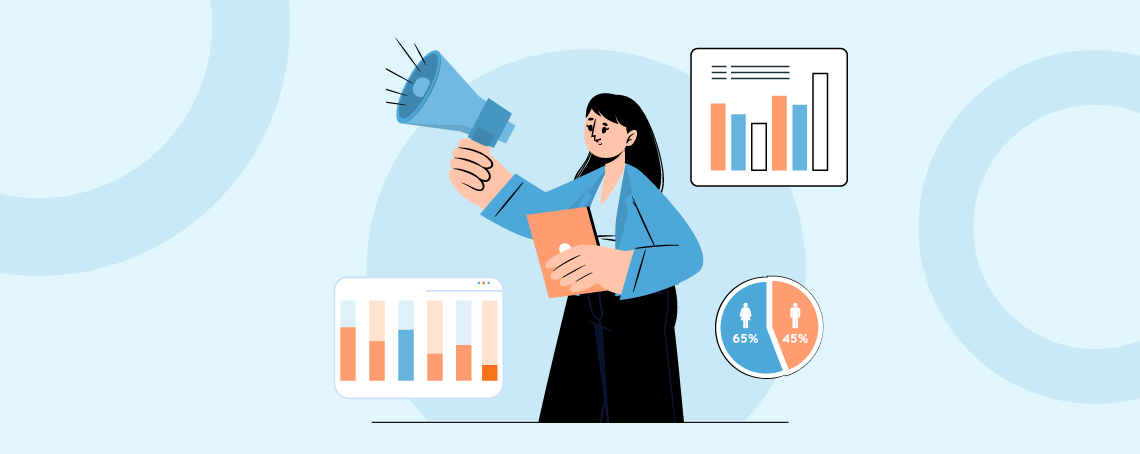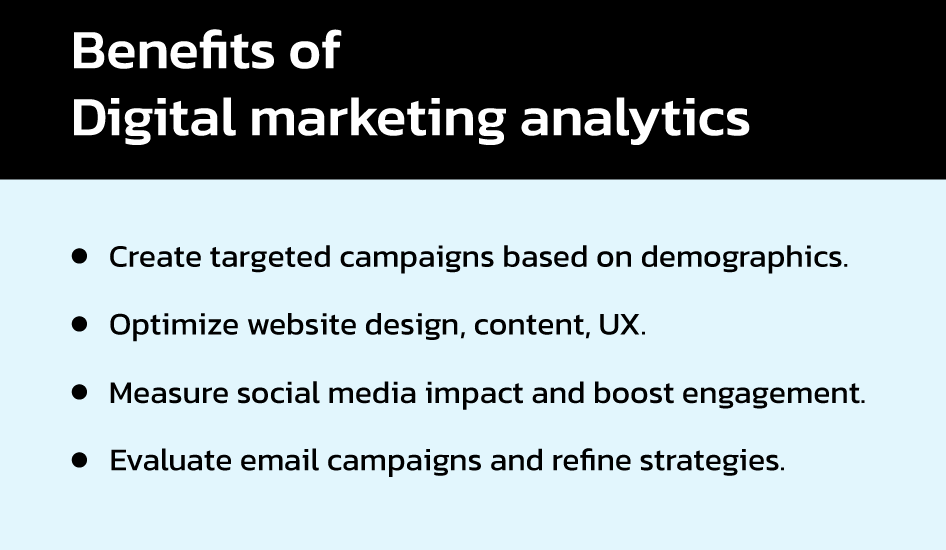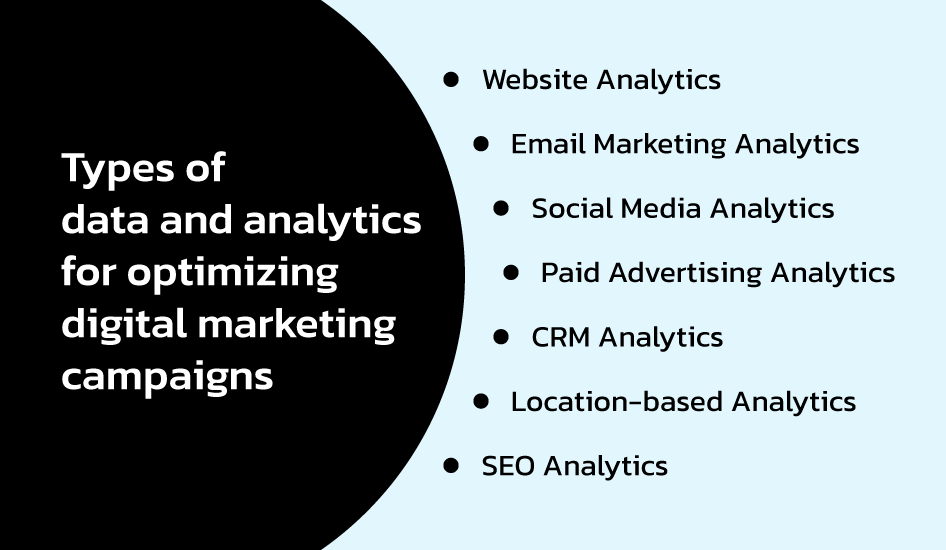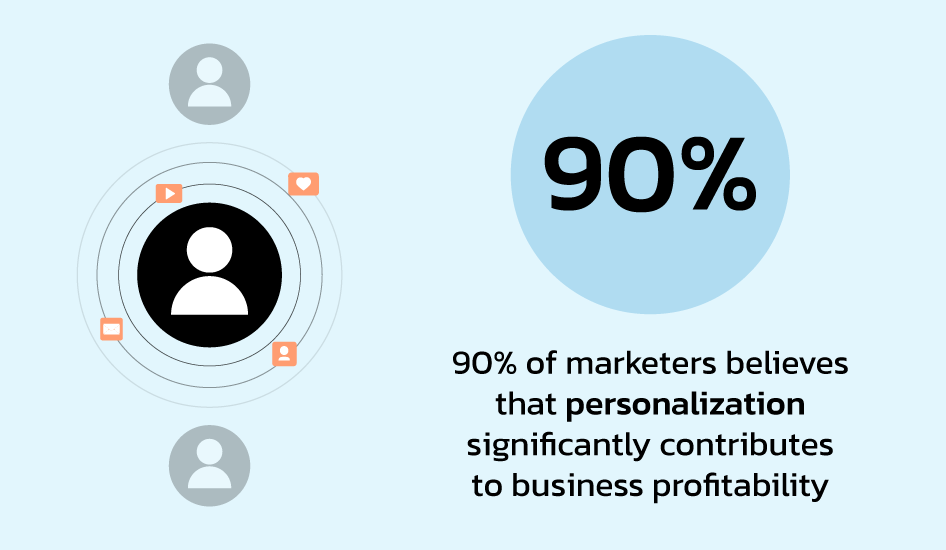Using Data Analytics to Build Your Digital Marketing Strategy

It’s 2023, and we can argue how long a business can survive without money. But it is for sure that no business can survive without accurate data. Data analytics has become an integral part of all businesses. And that is why Your and Many other business persons are constantly looking to Optimize your digital marketing campaign – making it more data-driven.
Marketers can gain valuable insights into consumer behavior and preferences by analyzing data from various sources, such as customer interactions on websites and social media platforms. These insights can then optimize digital marketing campaigns and drive better results.
In a recent survey, 64% of marketing leaders emphasized the importance of data-driven strategies in today’s economic landscape. These approaches allow businesses to gather valuable insights into their clients’ purchasing patterns, actions, thought processes, preferences, and motivations, providing a comprehensive picture of their target audience.
In this post, we will see how data analytics can be used to optimize your digital marketing campaign and provide some practical tips on how to get started.
Let us begin with the understanding of what is digital marketing analytics. Without this, you won’t be able to optimize your digital marketing campaign.
What is Digital Marketing Analytics?
Digital Marketing Analytics refers to collecting, analyzing, and reporting online data related to a company’s marketing efforts to understand the performance of its marketing campaigns and improve future marketing strategies.
Digital marketing analytics involves tracking web traffic, identifying user demographics and understanding user behavior, monitoring social media engagement, assessing the success of email campaigns, and examining data from other sources like mobile apps and point-of-sale systems.
Data analysis provides actionable insights to measure the ROI of marketing spend, optimize the marketing mix and ultimately reach desired business objectives.
Why You Shall Give Data is too important to optimize your digital marketing campaign?

Using data in marketing offers numerous benefits that help organizations achieve better results and gain a competitive edge.
Some key reasons why data should be an integral part of your marketing strategy include:
Enhanced Customer Understanding
Collecting and analyzing data enables marketers to gain deeper insight into customer personas, pain points, buying patterns, and decision-making processes.
With this knowledge, organizations can develop more effective marketing strategies, products, and services that resonate with their target audiences.
Competitive Advantage
Leveraging data gives organizations a unique perspective on consumer behavior, enabling them to stay ahead of industry trends, adapt quickly to market conditions, and anticipate future demand.
By being data-driven, brands can differentiate themselves from competitors and establish a strong position in their respective markets.
Personalization and Targeting
Utilizing data allows marketers to personalize content and messaging according to individual consumer preferences and behaviors.
This improves engagement and conversion rates as customers receive tailored experiences catering to their needs. Moreover, targeted advertising helps reduce wasted ad spend on irrelevant audience segments, saving money and enhancing overall ROI.
Measurement and Attribution
Tracking and measuring the impact of marketing activities is vital to determine what works best and what needs improvement. Data provides concrete evidence to evaluate campaign performance, identify areas of opportunity, and allocate the budget accordingly.
This granular level of measurement helps attribute conversions and revenue back to specific marketing channels and tactics, allowing for informed decision-making.
Cost Savings
Effective use of data reduces waste in marketing expenditure by focusing on high-performing channels and tactics. It also minimizes the need for expensive A/B testing since data analysis.
What Type of Data and Analytics One Should Know to Optimize Your Digital Marketing Campaigns
Several types of data and analytics are crucial to optimizing digital marketing campaigns:

Website Analytics
Tools like Google Analytics provide detailed metrics on website traffic, user behavior, and conversion rates. These insights enable marketers to fine-tune landing pages, improve navigation, and adjust content for maximum engagement and lead generation.
Social Media Analytics
Platforms like Facebook Insights, Twitter Analytics, and LinkedIn Business Intelligence offer data on follower demographics, post engagement levels and audience interests.
This information helps marketers design social media strategies tailored to their target audience, increase brand visibility, and expand reach.
Paid Advertising Analytics
Google AdWords, Bing Ads, and other paid search platforms supply data on keywords, bid prices, click-through rates (CTR), and cost per acquisition (CPA).
Analyzing these metrics guides marketers toward creating successful pay-per-click (PPC) campaigns while maintaining profitability.
Email Marketing Analytics
Services like MailChimp, Constant Contact, and Campaign Monitor offer email open rates, click-through rates, bounce rates, and unsubscribe statistics.
Marketers refine message content, subject lines, and delivery times by studying email performance indicators to boost subscriber interaction, retention, and sales.
CRM Analytics
Customer relationship management (CRM) software captures data on customer interactions, purchase history, and support requests.
This information facilitates personalized communication, targeted promotions, and improved customer service – all of which contribute to increased loyalty and higher lifetime values.
Search Engine Optimization (SEO) Analytics
Tools like SEMrush, Ahrefs, and Moz furnish keyword rankings, organic traffic, and backlink profiles.
Through SEO analytics, marketers optimize websites for search engines, boost domain authority, and elevate visibility in relevant search results.
Location-based Analytics
Geolocation data collected through GPS, beacons, or mobile devices can reveal consumer behavior patterns based on location.
This information helps marketers design localized advertising campaigns, target foot traffic to physical stores, and optimize distribution networks.
To maximize the effectiveness of digital marketing initiatives, gathering and analyzing different types of data across various platforms and channels is essential.
By doing so, marketers can better understand their target audience, measure campaign performance, and adjust strategies to achieve desired outcomes.
Why Are Companies Facing Too Many Troubles Working with Data?
Optimizing digital marketing campaigns requires quality data that clearly understand customer behavior, preferences, and interests. However, marketers often face several obstacles when trying to access this information.
Here are some common challenges they encounter when seeking high-quality data to power their campaigns:
Data Privacy Concerns
Protecting customer privacy has become even more crucial with enforcement regulations like GDPR and CCPA. Marketers must comply with these laws while accessing the data required for campaign optimization. Balancing data protection and usage can be challenging, especially given the complex nature of digital marketing ecosystems.
Inaccurate or Outdated Data
Marketers rely heavily on data accuracy and freshness to create impactful campaigns. Poor data quality, incomplete records, or outdated information can lead to misleading conclusions and incorrect decisions.
Implementing robust data validation and cleaning techniques is essential to maintain data quality. Moreover, ensuring real-time updates or frequent data refreshes is necessary to keep up with evolving customer behaviors.
Data Silos
One of the biggest issues marketers face is the existence of data silos across different departments or teams. Each department might have its own data set, making collating and analyzing the information holistically difficult.
This leads to incomplete or fragmented customer journey views, resulting in suboptimal campaign execution.
Data Integration Challenges
Even when marketers do manage to bring together data from multiple sources, they often struggle with integrating them seamlessly.
Different data formats, inconsistent naming conventions, and disparate technologies make it challenging to combine data sets effectively.
Without proper integration, marketers cannot leverage the full potential of their data, leading to missed opportunities for optimization.
Lack of sophisticated tools and algorithms
To extract meaningful insights from large datasets, many marketers lack the skills and resources to use these advanced tools effectively. Marketers may also struggle with translating raw data into actionable recommendations, making optimizing campaigns based on data findings difficult.
In conclusion, overcoming these challenges facing marketers starved for quality data is essential to maximize the effectiveness of digital marketing campaigns.
Implementing appropriate data management practices, adopting cutting-edge technologies, prioritizing data security and privacy, fostering cross-departmental collaboration, and continuously upskilling teams are critical to surmounting these obstacles.
By addressing these challenges head-on, marketers can unlock the true value of their data and drive growth for their organization through optimized digital marketing endeavors.
Top 5 Tips to Use Data and Analytics to Optimize Your Digital Marketing Campaigns

As technology advances and consumer behavior shifts, the amount of data collected, stored, and utilized grows rapidly. The widespread adoption of mobile devices, artificial intelligence, and the digital revolution have all contributed to this trend.
However, despite its increasing significance, some marketers remain unaware of the benefits and proper implementation of reliable and verified B2B data in their campaigns.
According to a study, 87% of marketers believe data is severely underutilized within their respective industries.
Organizations can significantly enhance their chances of achieving successful outcomes by incorporating data into various marketing efforts such as email campaigns, pay-per-click advertising, retargeting, social media promotions, and omnichannel initiatives.
Data can be a powerful ally in boosting any marketing endeavor’s efficacy and return on investment (ROI).
1. Understanding Your Target Audience
The first step in improving any marketing strategy is understanding your target audience.
Data analytics provides information about customer demographics, interests, and online behavior.
This information can help you create buyer personas representing your ideal customers, informing your content creation and messaging strategy.
By segmenting your audience based on demographic and psychographic characteristics, you can tailor your marketing efforts to specific groups of people who are more likely to respond positively to your message. This can lead to higher conversion rates and improved ROI.
2. Identifying Key Performance Indicators (KPIs)
Once you have identified your target audience, the next step is to determine what key performance indicators (KPIs) you should be tracking to measure the success of your marketing campaigns.
Some common KPIs include website traffic, conversion rate, cost per acquisition, and return on ad spend.
Data analytics tools can help you track these metrics over time and identify trends that may indicate areas for improvement.
For example, suppose you notice that your conversion rate is declining. In that case, you may need to adjust your landing pages or test different calls to action.
Similarly, if your cost per acquisition is too high, you may need to reconsider your advertising budget or targeting strategy.
3. Testing and Experimentation
Experimentation and testing are other important aspect of using data analytics to improve marketing strategies. With so much data available at our fingertips, testing new ideas and seeing how they perform before implementing them on a larger scale is possible.
For instance, you could run A/B tests on different landing page versions to see which one converts better or test out different email subject lines to see which ones generate more opens and clicks.
You could also use multivariate testing to test multiple variables simultaneously, allowing you to isolate the impact of each variable on your overall results.
Experimentation lets you decide which strategies work best for your audience and helps you continuously refine your approach.
It also helps build trust between you and your audience by showing that you value their feedback and are willing to adapt accordingly.
4. Personalization and Segmentation
Personalizing your marketing messages is another way to improve the effectiveness of your campaigns.
To Optimize your digital marketing campaign – using data analytics tools, you can segment your audience based on their interests, behaviors, and other relevant criteria. This paves the way for you to communicate with your audience in a way that is more likely to hit home and result in sales.
For example, you might send different emails to subscribers based on their purchase history or browsing behavior on your site.
You could also personalize your website experience by displaying customized product recommendations or offering special discounts to returning visitors.
5. Measuring Results and Making Adjustments
Finally, measuring results and adjusting based on those measurements is critical to improving your marketing strategies.
Regularly reviewing your data analytics reports can help you understand what’s working well and what needs to be tweaked.
For instance, if a certain Facebook ad generates a lot of engagement but not many click-throughs, you might consider revising the ad copy or changing the call-to-action to encourage more users to click through.
Similarly, suppose you notice that a particular landing page has a low conversion rate. In that case, you may want to consider testing different design elements or changes to the user interface.
It’s also important to regularly monitor industry trends and benchmark against competitors to stay ahead of the curve.
Conclusion
By leveraging data to gain insight into customer behavior, identifying key performance indicators, testing and experimenting with new approaches, personalizing communications, measuring results, and making adjustments, businesses can optimize their digital marketing campaigns and drive growth.
Harnessing customer, operational, and financial data can significantly enhance a company’s marketing efforts regarding customer engagement, value creation, and return on investment (ROI).
At NFlow, we boast extensive expertise to optimize your digital marketing campaign and use various digital marketing tools. Our emphasis on data-driven solutions empowers clients to leverage valuable insights for well-informed decision-making.
To learn how our skilled professionals can transform your marketing initiatives via data analytics and innovative digital methods, please don’t hesitate to reach out.







